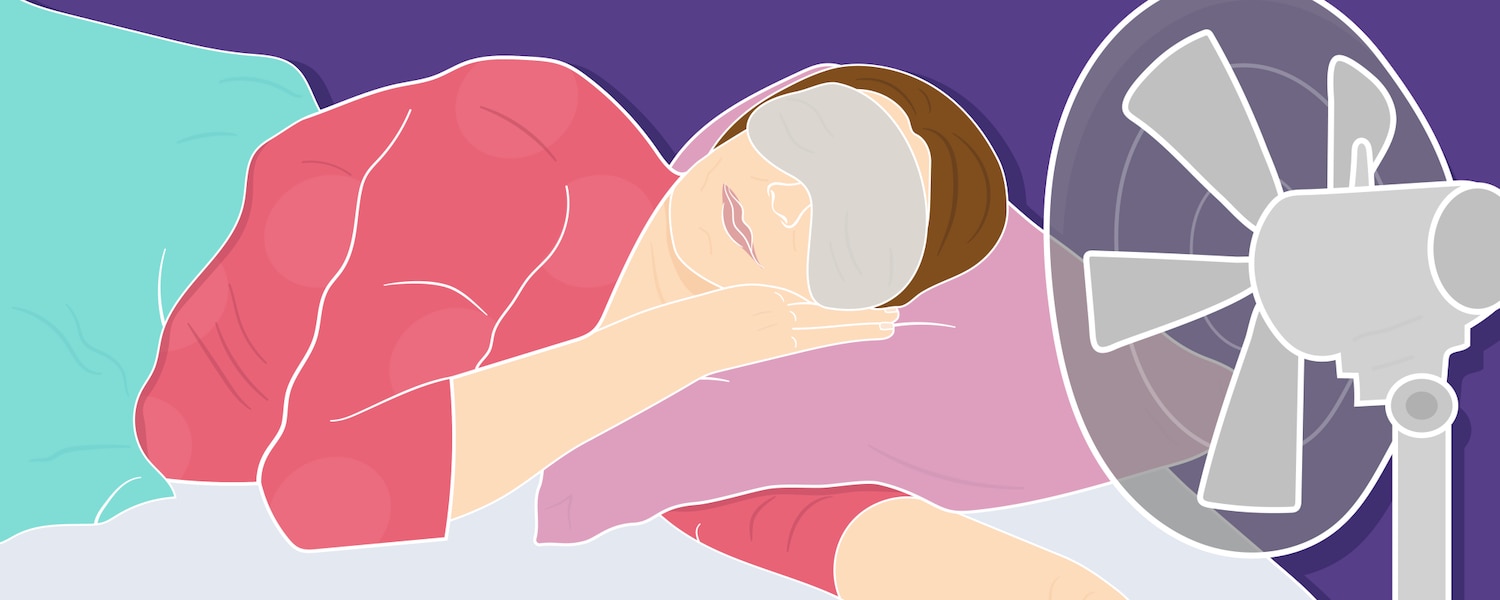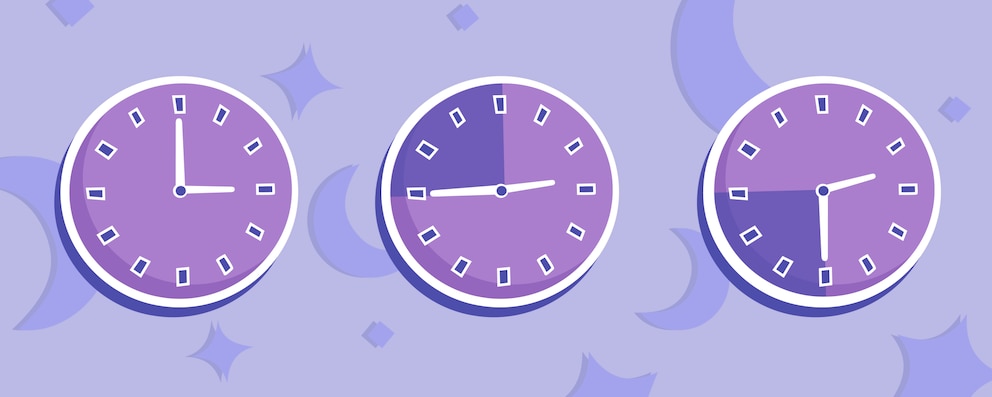How does menopause affect sleep?

Getting a good night’s sleep brings a bucketload of benefits for our health – but this can be tricky if you’re experiencing menopause. Come along and learn how menopause affects your sleep and discover a few tips and tricks for a successful snooze, so you're ready to take on daily life fearlessly.
Do you need more sleep during menopause?
Although research tells us that women in general should aim for 7-8 hours of quality, uninterrupted sleep [1], there’s no hard and fast rule. Some of us might need less sleep, while others might need more, and that’s completely normal.
While it's tempting to dive into the details of how many hours of sleep you need during menopause, putting too much emphasis on the exact time can actually add more stress and anxiety to the mix. What’s most important is the quality of sleep. Try testing a couple different schedules with more and less hours until you find that sweet spot where you feel rested in the morning.
And if you’re struggling to fall asleep, why not meditate or make yourself a cup of night-time caffeine-free tea to help you wind down?
Why does menopause affect sleep?
When we transition into menopause, a stage known as perimenopause, the levels of hormones that are responsible for the menstrual cycle (oestrogen and progesterone) start to fall gradually. This causes changes in our bodies and in turn the symptoms that can make sleeping a real challenge. Let’s break these changes down to understand them a bit better.
Increased sensitivity to temperature changes
Feeling too hot one minute then too cold the next? This is all down to your hypothalamus – the part of the brain that controls body temperature. During menopause, when your oestrogen levels fall, your hypothalamus can become more reactive. When your hypothalamus thinks that your body is too hot, it tries to cool you down with those pesky hot flushes and night sweats.
Less melatonin & more cortisol
A crucial part of restful sleep is melatonin, often known as the sleep hormone. As we age, our levels of melatonin naturally decrease, which could contribute to sleep challenges during the menopausal phase. A decrease in melatonin, combined with an increase in cortisol (the stress hormone that also wakes us up in the morning) due to aging can lead to another level of sleep struggle.
Disrupted circadian rhythm
The circadian rhythm is a scientific term for the process of how our bodies operate over 24 hours. If it is disrupted, you might notice that you're a bit drowsy and tired during the day, or that you find it more difficult to focus and have a bit of trouble remembering things. During menopause, a combination of decreased hormone levels and ageing shake up our circadian rhythm, therefore disrupting the sleep-wake cycle. [2]
Mood fluctuations
Which menopause symptoms impact sleep quality?
Menopause insomnia
Now we know why our sleep is affected during this life stage, we can tackle the signs and symptoms of menopause that potentially cause sleep disturbances.
Hot flushes and night sweats
If you suddenly start feeling warm, particularly in your upper body, you could be experiencing hot flushes. Hot flushes are a very common symptom of menopause, they’re so common that more than 80% of us will experience them at some point during menopause.[3] These hot flushes are caused by sensitivity to temperature and likely leave you feeling uncomfortable, agitated, and anxious.
A lower core body temperature is part of the natural process we go through to kickstart sleep. That’s why the increase in body temperature tends to mess with your rest.
Menopause insomnia
When lower progesterone levels cause body clock changes and mood fluctuations, we can develop menopause insomnia. This isn’t just a fancy term for a lack of sleep, it’s a specific condition that can affect you at every stage of the sleep cycle. People suffering from menopause-induced insomnia can find it difficult to fall asleep, stay asleep throughout the night, and often wake up far too early.
Insomnia during the menopausal phase can also be down to changes in life circumstances, whether you’re going through relationship difficulties or balancing your daily life with caring for ageing relatives. These stresses can make us feel overwhelmed and send our minds racing, making it even more difficult to sleep.
Sleep apnoea and snoring
Many of us know how difficult it can be to get a good night’s sleep when you add snoring into the mix, whether you wake yourself up from a loud snoring session, or your partner makes for particularly noisy bedtime company. During menopause, a combination of lower oestrogen and progesterone levels plus the possibility of weight gain can mess with the soft tissues in your throat, which could lead to snoring.
Restless Leg Syndrome (RLS)
How can I sleep better during menopause?
It can be overwhelming knowing how much menopause potentially affects your slumber. Luckily, there are some simple and even enjoyable ways to improve it and self-care can be a great starting point to getting a better night’s sleep.
Create a relaxing pre-sleep environment
Fix your sleep schedule, then stick to it

Exercise regularly
Better rest can start outside the bedroom too! Exercise is not only a great way to improve sleep, but also upgrade overall physical health and reduce stress. Just make sure you don't hit the gym or that yoga class too close to bedtime, as this can cause an increase in hormones and core body temperature that potentially hinder sleep. Saving workout sessions at least 3 hours before bedtime is usually best.
Fully switch off before bedtime
Try to avoid large meals before bed
Limit alcohol and caffeine
What are professional treatments for menopause sleep problems?
If you’ve given self-care a go and still find yourself struggling to sleep, there are professional treatment options to help you manage your symptoms effectively. Whether you’re looking to fight hot flushes or manage your mood, consider having a chat with your doctor. They’ll be able to reassure you and guide you towards the right treatment, which could include:
Hormone Replacement Therapy (HRT)
Cognitive Behavioural Therapy (CBT)
Medical disclaimer
The medical information in this article is provided as an information resource only and is not to be used or relied on for any diagnostic or treatment purposes. Please consult your doctor for guidance about a specific medical condition.
This article has been reviewed on 19th April 2024 by Karen Joash BSc (Hons), MSc, MBBS, MRCOG PGCert, ILM and MBA, Consultant Obstetrician and Gynaecologist at Queen Charlotte's and Chelsea Hospital and The Portland Hospital for Women and Children. You can find out more about mS Karen on her LinkedIn and X pages.
[References]
[1] https://www.hopkinsmedicine.org/health/wellness-and-prevention/how-does-menopause-affect-my-sleep
[2] The circadian variation of sleep and alertness of postmenopausal women - Rafael Pérez-Medina-Carballo, Anastasi Kosmadopoulos, Philippe Boudreau, Manon Robert, Claire-Dominique Walker, and Diane B Boivin
[3] de Zambotti M, Colrain IM, Javitz HS, Baker FC. Magnitude of the impact of hot flashes on sleep in perimenopausal women. Fertil Steril. 2014;102:1708–150
[4] Hall MH, Kline CE, Nowakowski S. Insomnia and sleep apnea in midlife women: prevalence and consequences to health and functioning. F1000Prime Rep. 2015;7:63.
[5] https://www.sleepfoundation.org/nutrition/alcohol-and-sleep
[6] https://www.sleepfoundation.org/nutrition/caffeine-and-sleep



